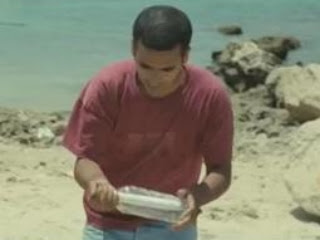Like Levy's movie, "Bottle" (directed and co-written (with Valérie Zenatti) by Thierry Binisti, who is shown at left) takes off from a striking premise: The film opens with a terrorist attack in Israel, unseen but heard against the black screen. We see but a brief moment of the result of this attack before we begin to be immersed in the life of a French/Jewish high school girl, Tal, who has moved with her family to Israel, where her brother now serves in the Israeli army and has agreed to toss a sealed bottle with a message written by his sister into the sea. And yes, while the "message-in-bottle" movie is old hat, setting it in Israel/Palestine makes it live anew. (This was also quite true of the premise of The Other Son.)
No sooner have we heard this premise than we begin imagining the outcome. Sure, the bottle will be found by a Palestinian (the fellows above, as a matter of fact) and thus set up an immediate "dilemma" leading to what? A kind of middle-east Romeo & Juliet? Yet this premise of Bottle turns out to be a great one in the hands of these filmmakers because nothing is imagined nor played for simple cliché and easy accommodation. This is tricky territory, trod many times already but rarely, as is also true with The Other Son, so well.
What makes this movie so special is the care it takes to keep its characters real -- at the same time as it continues to probe the situation around them, both familial and national -- while keeping open the lines of communication between the two. And isn't open communication, despite a continuing barrage of horror, one key to solving seemingly insoluble territory/occupation disputes, whether they be in the Middle East or Ireland or Quebec?
Full of small bits of surprise that could, under other circumstances, bring its people closer, but here would more likely separate them further, the movie is remarkably nuanced in the treatment of characters and the connections that bind or break them.
A Bottle in the Gaza Sea, another first-class film distributed by Film Movement, opens in New York City this Thursday, January 3, at the JCC, and on Friday, January 4, at the Quad Cinema. I would hope other venues around the country will be forthcoming. Click here to see any currently scheduled playdates, with cities and theaters.


.jpg)


.jpg)








No comments:
Post a Comment